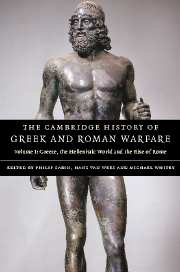Book contents
- Frontmatter
- Introduction: The Historiography of Ancient Warfare
- 1 The modern historiography of ancient warfare
- 2 Warfare in ancient literature: the paradox of war
- 3 Reconstructing ancient warfare
- Part I Archaic and Classical Greece
- Part II The Hellenistic World and the Roman Republic
- Chronological Table
- Glossary
- List of Ancient Authors
- Bibliography
- Index of ancient passages cited
- General index
- Map 1 The western Mediterranean
- Map 3 The Near East
- References
2 - Warfare in ancient literature: the paradox of war
from Introduction: The Historiography of Ancient Warfare
Published online by Cambridge University Press: 28 March 2008
- Frontmatter
- Introduction: The Historiography of Ancient Warfare
- 1 The modern historiography of ancient warfare
- 2 Warfare in ancient literature: the paradox of war
- 3 Reconstructing ancient warfare
- Part I Archaic and Classical Greece
- Part II The Hellenistic World and the Roman Republic
- Chronological Table
- Glossary
- List of Ancient Authors
- Bibliography
- Index of ancient passages cited
- General index
- Map 1 The western Mediterranean
- Map 3 The Near East
- References
Summary
introduction
Wars and fighting are very prominent in the literature of classical antiquity. That is notoriously true of Greek historians from Thucydides on. It is true of those early Greek poets who wrote about real events, like Simonides, and of those many others who wrote about a mythical world but one realistically set. It is even true of a poet like Sappho for whom a troop of horse, an infantry battalion, and a fleet of ships are numbers two, three and four in a list of desirables in which number one is the love-object (fr. 16 LP); and L. H. Jeffery once pointed out that the names of the Spartan girls in Alcman’s Partheneion, Astymeloisa and so on, stress that they are the ‘daughters of a warrior aristocracy’. But in neither Greek nor even Roman culture was war glorified or regarded as the natural state of affairs, though winners naturally ‘glorified’ one aspect of war – their own victories. I will argue that war, at least of the full-scale ritual agonal sort found in literature, was not so common a feature of actual life as is often thought; also that non-literary evidence attests a range of institutionalized ways of avoiding armed conflict, about which literary sources are nearly silent. So if this was the reality, why the literary prominence of crude male war? This is the paradox of the sub-title of the present chapter; but there are really two related paradoxes, first that literature professes a dislike of war, and is yet fascinated by it; second, that the prominence of war is disproportionate to its frequency and significance in practice.
Keywords
- Type
- Chapter
- Information
- The Cambridge History of Greek and Roman Warfare , pp. 22 - 53Publisher: Cambridge University PressPrint publication year: 2007
References
- 9
- Cited by

